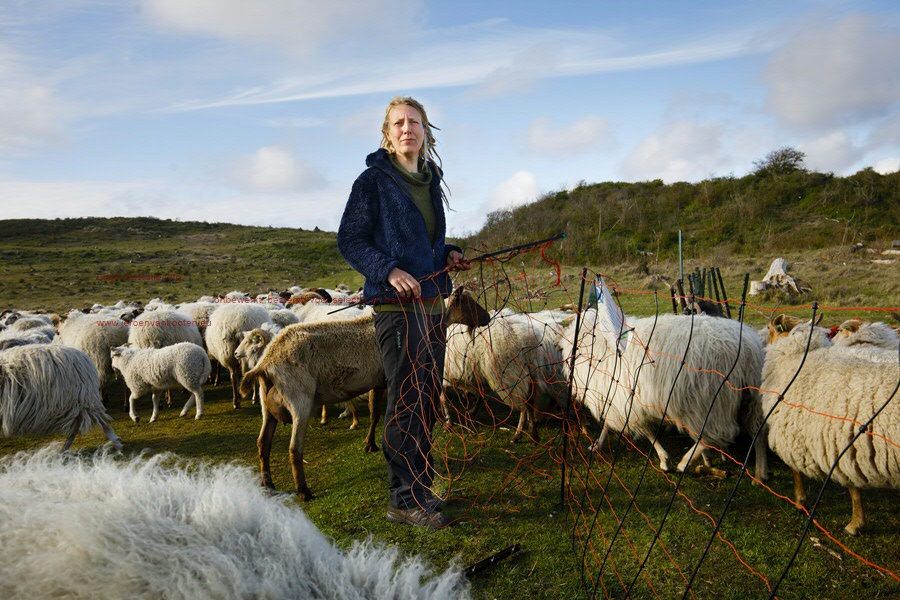‘Als ik de weg kwijt ben en onzeker lijk, dan zijn ze zo weg’
Daphne Hogeweg (40) is schaapsherder. ‘Mensen denken dat dieren dom zijn. Maar als je echt goed op ze let, beter kijkt, dan zie je dat ze vaak slimmer zijn dan mensen.’
Tekst Sara Plat; Foto Jeroen van Kooten; Bron: Broerstraat 5
‘Ik was als kind al gek van dieren. Er zijn in onze familie tal van verhalen over dat ik kwijt was. Dan was ik naaktslakken aan het helpen oversteken bijvoorbeeld. Ik ben opgegroeid in Amsterdam, daar was ik soms overprikkeld. Door contact met dieren kwam ik tot rust.’ Daphne Hogeweg studeerde sociale geschiedenis aan de RUG. Na haar bachelor voltooide ze nog een master Photographic Studies in Leiden. Daar werd ze opgeleid tot wetenschappelijk museummedewerker. ‘Maar het knaagde. Ik wilde een beroep met dieren, maar dan wel iets waar dieren geen geweld mee wordt aangedaan. Het werd herder. Daarvoor gebruik je de schapen niet, want eten doen ze toch, de hele dag door.’

Hogeweg heeft inmiddels 450 schapen, verdeeld over twee kuddes. Eén in de Waterleidingduinen in Noord-Holland en één op Texel, waar ze ook woont. Samen met haar vriend Jesse, ‘een heel stel honden, drie paarden, twee konijnen, drie geiten en parttime drie kinderen.’ Hogeweg en haar kuddes worden ingehuurd door terreinbeheerders, zoals natuurorganisaties, overheden en ook particulieren. Die zien de kuddes graag komen. ‘Als je maait, maai je altijd insecten, nesten en amfibieën mee. Een schaapskudde eet er omheen en fungeert bovendien als taxi voor zaden en insecten, dat is beter voor de biodiversiteit. Het zijn eigenlijk een soort chique grasmaaiers.’
Hogeweg denkt dat je van dieren veel kunt leren. ‘Als je je verplaatst in dieren, zie je heel veel communicatie. Een schaap lijkt minder gezichtsuitdrukkingen te hebben dan roofdieren omdat hun ogen aan de zijkant van hun kop zitten. Maar als je ze goed bekijkt, zijn ze heel opmerkzaam en slim. Ze helpen elkaar, ze rouwen samen, maar hebben mij ook goed door: als ik de weg kwijt ben en onzeker lijk, dan zijn ze zo weg.’
Samen met een coach geeft Hogeweg ook cursussen aan leidinggevenden. Die lopen een dag mee met de kudde. ‘Dat is vaak heel confronterend voor de cursisten. Schapen lopen niet zomaar mee omdat je de directeur bent, dat naamplaatje lezen ze niet. Ik heb weleens gehad dat de kudde als een blok viel voor de secretaresse, en haar direct vertrouwde. Ze stapten zo achter haar aan de duinen door.’
Hogeweg is gelukkig met haar carrièreswitch. ‘Zeker met mooie zomeravonden. Het schemert, de mensen zijn weg en ineens scheren de gierzwaluwen boven de kudde om insecten te vangen. Soms hoor je de nachtegaal zingen, of lopen er herten langs. Helemaal perfect is het als het net heeft geregend. Frisgewassen gras smaakt voor de schapen extra lekker. Schapen houden ook enorm van berenklauw, dat groeit goed in de zomer. Daar eten ze binnen een paar minuten een hele bos van weg. Het geluid dat dat maakt, een keihard gecrunch, geeft mij veel voldoening. Voor mij als herder zijn het wel lange dagen, want pas als het donker is heb ik rust. Maar ik zie dan de schapen allemaal eten met een soort grijns. Dat zijn echt fijne momenten.’
